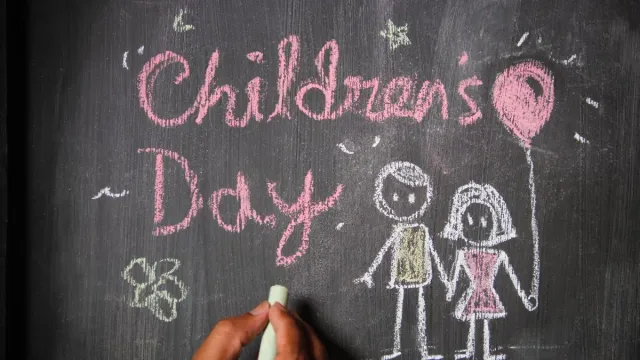- By Raghav Gupta
- Wed, 20 Nov 2024 09:43 PM (IST)
- Source:JND
World Children’s Day is an annual global observance day established by the United Nations to spread awareness of the importance of children and their welfare for both individuals and society. The observance of this day has great meaning for every country around the world as it symbolises a cause that is vital not only for society but the entirety of human civilization. To better promote this cause, India observes this day on November 14 rather than 20 unlike most of the world. The reason for this difference is historically tied to one of the major historical figures of India, Pandit Jawaharlal Nehru.
What is World Children’s Day?
World Children’s Day on November 20 is a day of action and celebration of children’s rights throughout the world. It was first established in 1954 as Universal Children's Day and has been celebrated each year to promote international togetherness, awareness among children worldwide, and improving children's welfare. November 20 is an important date as it marks the UN General Assembly adoption of the Declaration of the Rights of the Child in 1959 and Convention on the Rights of the Child in 1989.
This year’s theme is “Listen to the Future”, which encourages people throughout the world to actively listen to children’s hopes, dreams, and visions for the future, promoting children’s right to participation. This theme aims to encourage and empower children to voice their opinions about the world they want to live in. It also believes that adults have a responsibility to listen and support their visions.
What is Children’s Day?
Children’s Day is a national holiday celebrated in India that promotes children’s well-being and spreads awareness about issues related to child welfare in India. This celebration originates from India’s observation of World Children’s Day which was later changed to be observed on Pandit Jawaharlal Nehru’s birthday. This day not only upholds the ideals and cause of World Children’s Day but also aims to honour Nehru’s ideas and beliefs regarding child welfare.
Origins of Children’s Day in India
The first Children’s Day in India was celebrated after independence in 1959, however the foundation for this celebration had been set in motion years ago. In 1951, a United Nations Social Worker Fellow VM Kulkarni, who had been studying in England, observed how the Queen of England’s birthday had been used to focus attention on children’s issues and raise money for ‘Save the Child’ fund. This inspired him to first propose using Pandit Nehru’s birthday on November 14 as the date for Children’s Day and set the future foundation for this celebration.
In 1957, the President of India addressed the nation in a speech titled ‘A Plea for a Better Deal for Children’. Dr Rajendra Prasad said, “It is a welcome idea to have one day every year to be celebrated as Children’s Day when all questions pertaining to children and child welfare would receive special attention.”
India changed the date of this celebration to November 14 in 1964 after the death of Pandit Jawaharlal Nehru to further help rally national support and spread awareness about the cause. Over time, however, the original intent of the celebration has gradually been forgotten and has instead been replaced with the legend about Nehru’s love for children.
Reasons for choosing Nehru’s birthday for Children’s Day
Despite its origins, the reason behind celebrating Children’s Day on Nehru’s birthday still has a deep-rooted meaning in understanding his legacy and values. Jawaharlal Nehru’s love for children was not just symbolic, instead his love was deeply rooted in his personal ethos and experiences in life. His love for children was evident through his profound connection with the younger generation and has been captured in numerous photographs that show his genuine warmth and affection for children that went beyond political posturing. Jawaharlal Nehru considered children to be the torchbearers of progress and the architects of a new India. He believed in them having the potential to transform the nations towards a brighter future and worked tirelessly to ensure that they received the necessary tools for growth and development.
Due to his beliefs, Jawaharlal Nehru had been a passionate advocate for children’s welfare and education. He recognised the pivotal role education played in shaping minds and fostering a sense of citizenship to develop a progressive and enlightened nation. To achieve his vision, Nehru laid the foundation for the establishment of institutions of higher learning, including several of the leading institutes in India. His emphasis on scientific temperament and rational thinking reflected his belief that an educated populace was vital for national development. Due to his beliefs and ideas related to children’s welfare and education the best political candidate of his time to symbolize and lead the movement towards improving child welfare in India.

